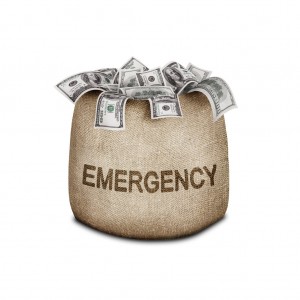|
In this issue:
Popular Scams Designed to Separate You From Your Money
Tips for Moving During Your Retirement Years
Easy Strategies to Build an Emergency Fund
| Popular Scams Designed to Separate You From Your Money |
| |
 You may think that only the elderly and naive fall for scams, but even the smartest and savviest among us can be taken in if we aren't careful. Here are four popular financial scams to inform your elderly friends and relatives about and to watch out for yourself. You may think that only the elderly and naive fall for scams, but even the smartest and savviest among us can be taken in if we aren't careful. Here are four popular financial scams to inform your elderly friends and relatives about and to watch out for yourself.
The Grandparent Scam
An elderly person gets a late-night or early-morning phone call from someone claiming to be his grandchild. This person also claims he's stranded in another state or another country and he needs money wired immediately for bail, bus fare, or some other misfortune that's befallen them. This is the Grandparent Scam and it's happening all over the country.
The "grandchild" asks the victim to keep the secret between them, using language such as, "Please don't tell mom, she'll freak!" Another sneaky aspect of this scam is the fact that the scammer often knows the first name of the grandchild, making the phone call that much more plausible.
Why it works: It preys on a grandparent's softer side and love for his grandchild. And it's absolutely vile.
How to avoid it: NEVER wire money to someone without first verifying (for sure) who they are and that it is appropriate. Double-check with other family members and call the person named in the phone call to see if he is really stranded in Mexico City. I'll betcha he's not.
The Phishing Scam
Your bank, credit card company, insurance company, PayPal or the IRS emails you with a piece of news you must act on immediately! Your password has been changed, your purchase has been confirmed, your account has been breached or some similar tragedy has occurred and you MUST click this link and log in right now to fix it! BZZZZT! Wrong answer.
If you click that link, you risk giving scammers your username, password and other personal data they can use to steal your identity. The tricky part is that most of these phishing emails appear legitimate, right down to the company logo and privacy policy at the bottom.
Why it works: Ironically these scammers prey on your sense of wanting to protect yourself. My account has been breached? Oh no, I better fix it now by clicking this handy link they provided. Don't do it.
How to avoid it: NEVER click through a link embedded in an email you get from a company or organization, especially if it isn't someone you already have a relationship with. Granted, your bank, credit card, or insurance company may email you from time to time, but even if it's a legitimate communication, it's always safer to open a new browser window, manually type their web address and search for the issue that way. Most of the time, there is no issue at all. To report a phishing email, simply forward it to: phishing-report@us-cert.gov.
The Heartstrings Scam
From Hurricane Sandy to Sandy Hook, disaster is a prime opportunity for the unscrupulous to take advantage of the kind and giving nature of others. It's disgusting, but it happens in the wake of every tragedy. Be on the lookout for email campaigns that send you to a good-looking, albeit fake, website, where they are all too happy to accept your kind donation for the cause. Unfortunately, the cause might be their own pockets.
There are several red flags to look for, such as "charities" that insist you wire cash or who put pressure on you to donate immediately. The key here is to be very wary of anyone soliciting for donations on behalf of a recent and highly publicized event. If you get an email asking you to support a victim fund of a recent disaster, it's likely a scam, as most charities don't solicit donations via email.
Why it works: People tend to want to help others in times of need and this scam preys on the kindness of strangers during a crisis.
How to avoid it: If someone calls you on the phone soliciting donations, tell her nothing. The best bet is to not entertain her call at all because, frankly, it's just too much work and too difficult to accurately determine whether they're legitimate. If you feel in the giving spirit in the wake of a tragedy, be safe by proactively contacting a charity you have a relationship with, or you know to be reputable.
The Breaking News Scam
"Click here to see live video of..." As awful as it sounds, human beings are often drawn to video - however jarring and disturbing - of tragic events, such as the Twin Towers falling or the Boston Marathon explosions. Scammers use this natural curiosity to their advantage by emailing a link that promises to show you "live video" of an event. The link will take you to a website that looks like YouTube or another legitimate website where you'll see the video. But what you won't know is that when you get there, you'll load malicious HTML, which targets vulnerabilities in certain browser plugins. If your browser is vulnerable, the malware will be silently installed in the background and you'll never realize it. Your machine will be infected and once that happens your personal data could be at risk or your computer can be used to send spam or perpetuate the malicious code.
Why it works: This scam takes advantage of the curious nature of human beings and the timing of newsworthy events.
How to avoid it: Going back to phishing, it's always safest to NEVER click on links embedded within the body of an email, especially if it comes from someone you don't know.
Whether they're high-tech or low-brow, and regardless of their form, scams are all about separating you from your money and scammers will stoop to the lowest of lows in their quest to get the job done. Foil them at every turn by being extra cautious, heeding the advice above and listening to your gut if something doesn't seem right.
Article courtesy of Yahoo Finance
Back To Top
|
| Tips for Moving During Your Retirement Years |
| |
As baby boomers ease into their golden years, many are asking an age-old retirement question: Should we move?
Traditionally, many retirees have picked up and moved to warmer places, such as California and Arizona. Others have migrated to states that combine a mild climate with low taxes, such as Florida or Texas.
Moving makes sense for many people, says Sheila Handy, department chair and associate professor of business management at East Stroudsburg University in East Stroudsburg, Pa. However, it is important to make smart choices before you uproot your life.
In the following interview, Handy offers her thoughts about what retirees need to consider before moving.
Some people think about moving after they retire. What are some good reasons for moving?
 There are several reasons one might want to relocate after retirement. Many reasons would likely relate to finances, such as moving to an area with a lower cost of living, "trading down" for a small house with lower property taxes and less maintenance, and choosing a state with a lower income tax rate and/or an overall lower cost of living. There are several reasons one might want to relocate after retirement. Many reasons would likely relate to finances, such as moving to an area with a lower cost of living, "trading down" for a small house with lower property taxes and less maintenance, and choosing a state with a lower income tax rate and/or an overall lower cost of living.
Other reasons may include moving to an area with a better climate or to be closer to family, and to move to a smaller house - perhaps a one-level home or one where maintenance is performed by others.
What types of problems can moving solve?
Depending on where the retiree decides to move, he or she may avoid such things as snow removal, yard care, and climbing up and down stairs. Also, if moving to a state with a lower personal income tax rate, retirees can increase their disposable income due to state taxes saved.
Additionally, moving into a smaller, less expensive house may result in the retiree earning additional income by investing the excess proceeds from the prior residence. If the retiree does not have adequate income from pensions and Social Security, then finding ways to reduce expenses will be imperative.
What variables are most important to consider when a retiree is contemplating a move across state lines?
Naturally, taxes should be a consideration. Some states tax only a portion of retirement benefits, and others fully exclude retirement income from tax. Certain states include a portion of Social Security benefits in the calculation of taxable income. Therefore, although the state tax rate may be lower, if a larger amount of income is taxed, then the overall tax liability may be greater in one state than another.
Additionally, inheritance taxes vary by state, so retirees with large estates should be aware of the potential state "death tax" burden.
As previously mentioned, a state with a lower cost of living will be more attractive to retirees, as long as it is not offset by reduced services, such as health care and safety.
Should a state's crime rate be considered?
The crime rate is a factor that anyone contemplating a move should consider, not just those who are moving due to retirement. However, since retirees might spend more time traveling, moving to an area with a lower crime rate might result in greater peace of mind.
What about access to medical care?
This is also an important consideration, since the need for health care tends to increase as one ages. Retirees should not have to travel a great distance to secure quality health care.
Article courtesy of Bankrate.com
Back To Top
|
| Easy Strategies to Build an Emergency Fund |
| |
 Some financial experts suggest consumers should be saving 10 percent of their income for unanticipated expenses. These are essentially financial "emergencies," such as replacing the engine in your car or repairing damage to your home. Some financial experts suggest consumers should be saving 10 percent of their income for unanticipated expenses. These are essentially financial "emergencies," such as replacing the engine in your car or repairing damage to your home.
However, according to the U.S. Federal Reserve, most Americans save just 2.5 percent of their disposable personal income, which can make preparing for financial emergencies difficult.
Fortunately, there are ways to build a solid emergency fund. Consider taking these steps:
Get serious about repaying debt. Every dollar that you pay in interest on debt is a dollar that could be going to your savings. As such, paying off debt should be a top priority - even if it means temporarily taking a second job.
Use direct deposit. Set a certain amount of your income to be automatically deposited into your checking or savings account. Even socking away a small percentage can help you accumulate cash for a substantial emergency fund.
Delay spending. Stores, shopping networks and online shops make it easy to buy now. So-called "impulse purchases" can take a toll on your finances. Making a conscious decision before any purchasing can help you decide what items are worth buying - and what money can be put to better use in your emergency fund.
Reward yourself when you reach goals. Accumulating an emergency fund shouldn't be seen as a painful task. Rather, you should celebrate your savings behaviors. When you put another $500 in your emergency fund, it's OK to take a small indulgence like buying that nice scarf you've been eyeing.
Use your credit card sparingly. A 2008 study led by Priya Raghubir, a professor of marketing at New York University, showed consumers tend to spend more money when paying with credit cards than they do when paying with cash, so leave your plastic at home. Take your card only when you have a planned expenditure to make.
Have a plan to reduce spending. Whether you "pay yourself first" or take whatever is available at the end of the month, you'll need to reduce spending or increase income in order to save. Create a plan to reduce spending in key areas by 5 or 10 percent, and put that savings in your emergency fund.
Watch your emergency fund grow. Your regular contributions plus compound interest will cause your fund to grow. Enjoy watching the balance of the account steadily increase over time.
Put a salary bump to good use. When you get a raise, it's time to adjust your budget. Take at least part of that extra money, and put it into your emergency account. Your standard of living won't increase, but it won't go down either.
Take advantage of coupons, rebates and cash-back cards. A quarter here, a dollar there - it adds up. Funnel extra savings into your emergency fund.
Don't quit before you start. You may have tried and failed to save an emergency fund in the past. However, that doesn't guarantee failure this time. Having learned from past experiences, you're more likely to be successful.
Article courtesy of U.S. News & World Report
Back To Top
|
|

 There are several reasons one might want to relocate after retirement. Many reasons would likely relate to finances, such as moving to an area with a lower cost of living, "trading down" for a small house with lower property taxes and less maintenance, and choosing a state with a lower income tax rate and/or an overall lower cost of living.
There are several reasons one might want to relocate after retirement. Many reasons would likely relate to finances, such as moving to an area with a lower cost of living, "trading down" for a small house with lower property taxes and less maintenance, and choosing a state with a lower income tax rate and/or an overall lower cost of living. You may think that only the elderly and naive fall for scams, but even the smartest and savviest among us can be taken in if we aren't careful. Here are four popular financial scams to inform your elderly friends and relatives about and to watch out for yourself.
You may think that only the elderly and naive fall for scams, but even the smartest and savviest among us can be taken in if we aren't careful. Here are four popular financial scams to inform your elderly friends and relatives about and to watch out for yourself. Some financial experts suggest consumers should be saving 10 percent of their income for unanticipated expenses. These are essentially financial "emergencies," such as replacing the engine in your car or repairing damage to your home.
Some financial experts suggest consumers should be saving 10 percent of their income for unanticipated expenses. These are essentially financial "emergencies," such as replacing the engine in your car or repairing damage to your home.